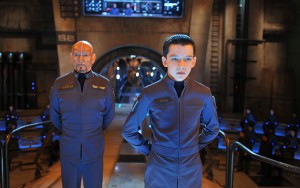Ender’s Game impresses visually but lacks emotion
This year has marked the release of several large-scale science fiction films criticized for plots lacking in substance. Elysium, Oblivion, Pacific Rim and After Earth all showed majestic glimpses into futuristic worlds but disappointed in terms of plot. Ender’s Game is the latest foray into the realm of presenting futuristic beauty on the screen, but this version does it with a much more complex plot as it is based upon Orson Scott Card’s classic sci-fi novel of the same name.

The young commander · British actor Asa Butterfield (right) stars as Andrew Wiggin in Ender’s Game, the new film adaptation of Orson Scott Card’s 1985 science fiction novel of the same name. The film is set in 2086, when an alien race attacks Earth and threatens its existence. – Photo courtesy of Lionsgate Films
The story revolves around the training of 12-year-old Ender Wiggin to defend the Earth from alien invaders. The leaders of Earth’s military decide that children, through their ability to think differently, are better suited to analyze the complex battle situations put before them, so the children are put through rigorous training and testing in the search of the ones who could possibly lead the world’s defense. Wiggin stands out from his peers and is noticed by the head of the battle school. Soon, his rise to the top is expedited.
Wiggin is played by young Asa Butterfield, who we last saw as the title character in Hugo. Butterfield is great at expressing the very complex range of emotions that Wiggin experiences in his challenging training process while remaining very understated. Very impressive stuff from the 16-year-old actor.
The original novel is lauded for both its complex look at the morality of violence and the difficulties Wiggin faces as a young man isolated from his peers. The film focuses on both these aspects a great deal. The superior that takes a special interest in Wiggin, played by Harrison Ford, has a major role in both of these important narratives. In his best role since the ’90s, Ford presents a complex leader willing to manipulate Wiggin into committing acts of violence for the greater cause while isolating him and providing him with obstacles to hone his leadership skills. With recent roles in classics such as Cowboys and Aliens, Paranoia and Morning Glory, it’s nice to see Ford sink his teeth into such an interesting role, especially a major sci-fi classic.
The novel has taken 28 years since its publication to be adapted to film, and Card has played a major part in this. In stark contrast to the fast-track-to-the-screen treatment that popular young adult novels receive these days, the script underwent numerous rewrites and production was delayed constantly. Though Card’s primary concern was the treatment of the novel and the themes essential to its purpose, it is not hard to see the effect that modern technology has had on the final product as opposed to the movie we may have gotten in 1985. As maligned as the extensive use of CGI has been in recent times it has given us breathtaking visuals this year, especially in sci-fi films. Ender’s is fantastic in this regard. The zero-gravity training battles and full-scale war scenes could certainly have been made to some extent in the mid-’80s — the Star Wars original trilogy had been completed by this time after all — but it is difficult to believe that they would’ve looked this impressive. The battle scenes are vast and absorbing, and the camera work in the weightless situation frames the multidimensionality of the action.
The film surpasses this year’s previous efforts at sci-fi epics in terms of balancing style and substance, and yet something seems to be off. It doesn’t match the atmospheric style of Oblivion or the impressive action of Pacific Rim. (After Earth’s distinctive nepotism is also missing, but not all failures to match this year’s sci-fi films are bad things). Something seems to be lacking. It does everything more than competently (acting, directing, writing) but it fails to come together as anything more than the sum of its parts. It’s never enthralling. Perhaps a major reason for this is the extent to which the movie remained faithful to the philosophical aspects of the book. Though not as prevalent, the details are pervasive to the point of becoming distracting from the story at times. The commitment to adhering to all these important notes of meaning seemed to have handcuffed Gavin Hood, the film’s director, a bit too much.
This is not a dealbreaker, as the film remains entertaining. This lack of a soul, however, undermines the meatier story it boasts in comparison to its 2013 sci-fi competitors. It impresses, but doesn’t amaze.
Follow us on Twitter @dailytrojan

Ender’s game kinda a surprised me in many ways